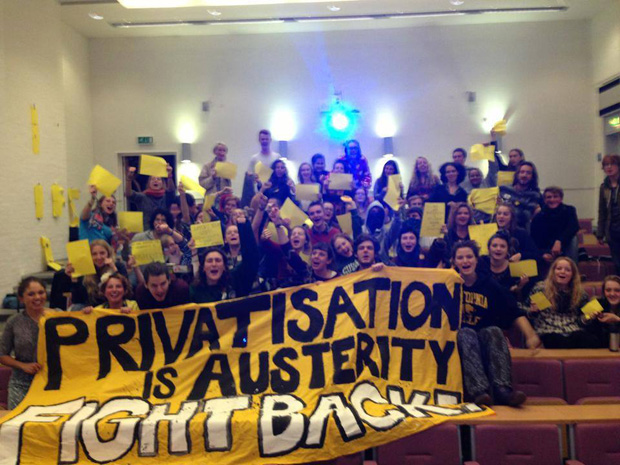
Sussex students during their university sit-in protest (Image: Occupy Sussex via Facebook)
Freedom of assembly and expression on British campus has become a hot topic, following two recent high profile cases.
On 5 December, five students from the University of Sussex were suspended for occupying a university building in protest at working conditions of staff, and privatisation. “We fully support students’ rights to protest lawfully. There have been regular demonstrations on a range of issues that have passed off peacefully,” said university’s registrar, John Duffy, according to the BBC. “But the university has been very clear that we will not tolerate any violence, intimidation or serious disruption. Unfortunately, we have seen all three of these kinds of behaviour once more take place in connection with the recent occupation and subsequent events.”
The same day, 41 people were arrested as 100 police officers broke up a sit-in protesting attempts to shut down the University of London Student Union, Channel 4 reported. The Metropolitan Police claimed, among other things, that smoke bombs had been thrown at them, while University of London Student Union president Michael Chessum said the methods used by the police towards the students were “at a level of violence beyond anything I’d ever seen before.” The day before, the body representing London universities had also obtained a court order banning “occupational protest” for six months — a move labelled “draconian” by Chessum. ‘This is a regrettable but necessary step that we have taken in order to prevent the type of violent and intimidating behaviour that we have seen by protesters at Senate House recently,’ said Chris Cobb, Chief Operating Officer at the university.
John McDonnell MP tabled an early day motion, calling on Vice Chancellor Michael Farthing, “to retract the suspension of five Sussex students”. He commented that: “I am deeply anxious about the whole range of protests that are taking place because they are all peaceful, they are all students seeking to make their voices heard.
“But they’re being met with real intimidation and suspending students for an occupation is not acceptable.”
“It’s outrageous that students exercising their traditional democratic right to protest have been persecuted in this way.”
Michael Segalov, one of the suspended students from Sussex wrote in a comment piece in the Guardian that he believe him and the others “have been targeted for suspension, to intimidate the growing campus movement against privatisation.”
“Our occupation received national attention and the support of key political figures, activists and journalists. We are continuing to humiliate management. So they have tried to silence us while professing their support in principle for protest. Only yesterday afternoon, the university released a statement, saying they “fully support students’ rights to protest lawfully”. Their actions suggest otherwise.”
An online petition in support of the Sussex students has also received over 9,000 signatures. “The University of Sussex Students’ Union firmly believes in the right of students to protest against practices they deem unjust, and condemns the intimidation of students undertaking protest action by University management,” the petition read. “We do not believe he has grounds to suspend or exclude these students, and we call on the VC not to criminalise protest.”
The suspension has now been lifted, but this is not the end of the case, reports the Argus. “The University continues to take forward disciplinary processes in relation to these five students, who were involved in organising or leading the repeated serious disruption of campus through occupations, which have been characterised by intimidating behaviour, theft, damage and violence,” the University said in a statement.
Students at the University of London, meanwhile, have sent an open letter to the administration. “Universities ought to be nuclei of societal dialogue, as well as progressive political thought and action. Under no circumstances should they repress peaceful demonstrations. We stand in solidarity with all students of the University who exercise their right to peaceful protest, and denounce all attempts to curtail this right,” they write.
Activists have also called for a national day of action, set to take place tomorrow. “Across the country, students are initiating a vibrant, popular, winnable fight for democratic and public universities, free from exploitation and repression. We cannot be beaten if we stand together,” reads the description on a Facebook event asking people to meet at 2pm, 11 December at the University of London Union (ULU), or organise locally.
This article was posted on 10 Dec 2013 at indexoncensorship.org




